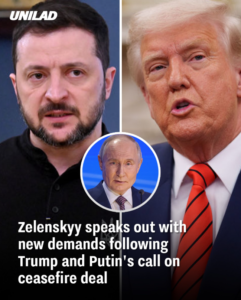In the wake of recent diplomatic efforts to establish a ceasefire in the ongoing Russia-Ukraine conflict, Ukrainian President Volodymyr Zelenskyy has articulated a firm stance, emphasizing Ukraine’s sovereignty and the necessity for any agreements to reflect the nation’s interests.
Recent Developments:
On March 18, 2025, U.S. President Donald Trump engaged in a high-stakes call with Russian President Vladimir Putin, aiming to negotiate a 30-day ceasefire focused on halting attacks on Ukraine’s energy infrastructure. While Putin agreed to this specific ceasefire, he imposed conditions requiring Ukraine to cease troop mobilizations and halt the reception of Western arms during this period. These stipulations have been perceived by Ukraine as potential threats to its defensive capabilities.
Despite the agreement, reports indicate that Russian forces conducted drone strikes targeting Ukrainian energy facilities shortly after the call, undermining the ceasefire’s credibility. A hospital in Sumy was bombed, and air raid sirens were activated across Ukraine, leading to civilian casualties and significant damage to infrastructure.
Zelenskyy’s Response:
President Zelenskyy has expressed skepticism regarding Russia’s commitment to the ceasefire, especially in light of the continued attacks. He emphasized that any ceasefire must be comprehensive and not limited to specific sectors like energy infrastructure. Zelenskyy underscored that partial agreements could leave Ukraine vulnerable to further aggression.
In a subsequent call with President Trump, Zelenskyy discussed the necessity of aligning any ceasefire terms with Ukraine’s security needs. He reiterated that Ukraine is open to peace negotiations but insists that any agreement must not compromise its sovereignty or defensive posture. Zelenskyy also highlighted the importance of involving Ukraine directly in all negotiations, ensuring that the nation’s interests are adequately represented.
International Reactions:
The international community has shown support for Ukraine’s position. German Chancellor Olaf Scholz and French President Emmanuel Macron have reaffirmed that any peace talks must include Ukraine and respect its sovereignty. They emphasized that unilateral agreements without Ukraine’s participation are unacceptable.
The United States has also maintained its support for Ukraine, with National Security Advisor Michael Waltz acknowledging the complexity of the negotiations and denying claims that the U.S. agreed to cut off military aid to Ukraine. The U.S. continues to facilitate dialogue while ensuring that Ukraine’s defensive needs are met.
Looking Ahead:
As the situation evolves, Ukraine remains committed to defending its sovereignty while being open to genuine peace negotiations. The recent breaches of the ceasefire by Russian forces have reinforced Ukraine’s cautious approach to any agreements. The international community’s role in supporting Ukraine and ensuring that any negotiations are conducted transparently and inclusively is crucial for achieving a sustainable resolution to the conflict.

